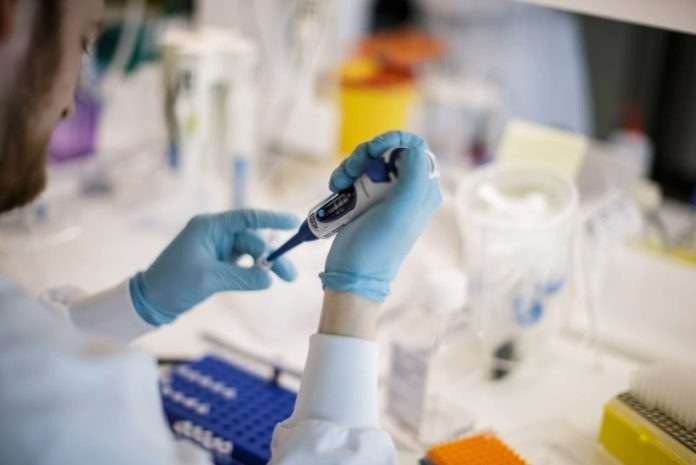The “British” type of infection has been shown to be twice as effective in airborne transmission as original coronavirus.
Coronavirus variants such as Alpha and Delta are extremely contagious, infecting considerably more people than the original virus did. Two new research suggest an explanation: the virus is changing to be more efficient at spreading by air.
The latest research do not fundamentally alter this perspective. However, the findings underscore the need for improved masks in some scenarios and suggest that the virus is evolving in ways that make it more dangerous.
The study led by Dr. Vincent Munster, a virologist at the National Institute of Allergy and Infectious Diseases, found that small aerosols reached much longer distances than larger droplets and the Alpha variant was much more likely to cause new infections via aerosol transmission. The findings of the second study showed that people infected with Alpha exhaled about 43 times more virus into tiny aerosols than those infected with older variants.
The investigations compared the Alpha variant to the original virus or to other ancestors of the virus. However, the findings may help explain why the Delta strain is so widespread — and why it has replaced all other viruses.
According to the study authors:
“It really indicates that the virus is evolving to become more efficient at transmitting through the air.”
“I wouldn’t be surprised if, with Delta, that factor were even higher.”
The variants’ ultratransmissibility may be a result of a number of circumstances. It is possible that smaller dosages of variants are necessary for infection, that variants replicate more quickly, or that more variant virus is exhaled into aerosols – or all three.
The Alpha strain was twice as contagious as the original virus, while the Delta variant possessed mutations that increased its contagiousness even further. As the virus evolves, specialists believe that subsequent types may prove to be even more transmissible.
However, the solutions at our disposal continue to operate effectively in containing the spread. According to a research of people infected with variants published this month in the journal Clinical Infectious Diseases, even loose-fitting fabric and medical masks block about half of the small aerosols containing virus.
Still, at least in some busy areas, people may want to consider wearing more protective masks, according to Don Milton, the study’s lead author and an aerosol expert at the University of Maryland.
To assess how different versions spread via the air, his researchers invited patients with moderate or asymptomatic infections to recite the alphabet, loudly sing “Happy Birthday,” or shout the University of Maryland’s slogan, “Go Terps!”
Individuals infected with the Alpha strain had significantly more viruses in their noses and throat than individuals infected with the original virus. However, even after accounting for this difference, those infected with the variant discharged around 18 times the virus into the tiniest aerosols.
However, the researchers investigated only four individuals infected with Alpha and 45 individuals infected with previous versions. This could distort the observed differences across variants, according to Seema Lakdawala, a respiratory virus expert at the University of Pittsburgh who was not involved in either of the new studies.
Infected individuals can spread the virus to a large number of others — or to none at all. How much virus they expel may be determined by the location of the virus replication in the respiratory tract, the composition of the mucus in its environment, and the presence of other bacteria.
“We have really no idea why some individuals are superspreaders and others are not,” Dr. Lakdawala said.
“There’s a lot of heterogeneity between individuals.”
Although data from a larger sample size would be more compelling, the two studies together imply that improved aerosol dispersion adds to the variant’s contagiousness, she added.
Dr. Munster’s investigation used Syrian hamsters rather than humans. Dr. Munster explained that using animals allowed the scientists to closely control the experimental settings and focus exclusively on aerosol mobility.
The researchers isolated pairs of hamsters using tubes of varying lengths that allowed for airflow but prevented physical touch. They assessed the ease with which the various variations spread from infected “donor” hamsters to uninfected “sentinel” hamsters.
Only the smallest aerosols — particles less than 5 microns — were found to infect the sentinel hamsters when the cages were more than two metres apart. And, as expected, the scientists discovered that the Alpha variation outperformed the original virus in terms of infection of the sentinel hamsters.
The researchers are currently testing the Delta and anticipate that it will be even more efficient, according to Dr. Munster.
Taken together, the new findings highlight the pivotal role of masks for vaccinated individuals, particularly in crowded areas, experts added. Although individuals who get breakthrough infections following vaccination are far less likely to spread the virus than uninfected individuals, the infectious nature of the variations increases the likelihood.
With billions of people worldwide vaccinated and billions remaining unprotected, Dr. Munster noted that the virus might still evolve in unforeseen ways:
“There might be additional evolutionary pressures, shaping the evolutionary direction of this virus.”
Image Credit: Getty
You were reading: Scientists identify another feature of COVID strains
